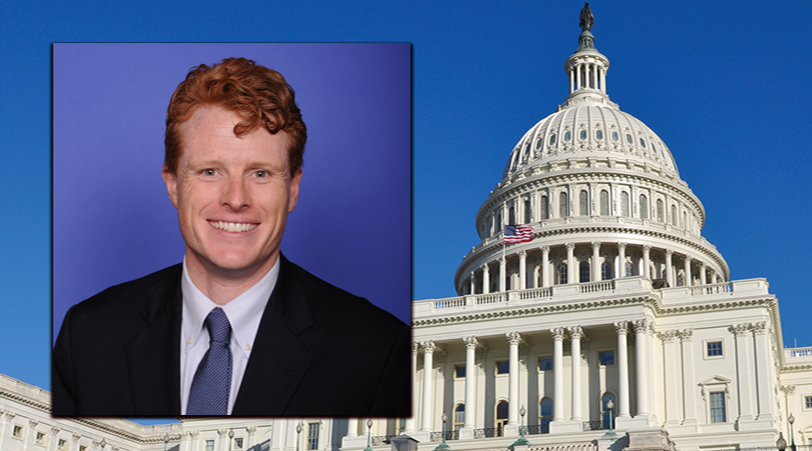WASHINGTON — He’s a Kennedy. He’s young. He’s gone “viral” on social media for blistering critiques of Republican lawmakers and President Donald Trump. In choosing Rep. Joe Kennedy III of Massachusetts to deliver the Democratic response to the State of the Union tonight, the party’s leadership has chosen someone who represents the liberal wing of the party and appeals to the middle class.
Kennedy, the grandson of former Attorney General and U.S. senator Robert F. Kennedy, gained national attention during the congressional health care debate last year, after speeches he delivered on the House floor denouncing GOP efforts to repeal and replace the Affordable Care Act went viral on Facebook.
“Congressman Kennedy is a relentless fighter for working Americans,” House Democratic Leader Nancy Pelosi, D-Calif., said in a statement. “While President Trump has consistently broken his promises to the middle class, Congressman Kennedy profoundly understands the challenges facing hard-working men and women across the country.”
At just 37, Kennedy, a one-time assistant district attorney in Massachusetts, will be tasked with responding to the president’s first State of the Union address. While Pelosi and other Democratic leaders think he’s a smart choice, others question whether voters still are enamored of the Kennedy dynasty.
Ross Baker, a political scientist at Rutgers University, believes the Democrats may be making a mistake by riding the coattails of the Kennedy family legacy by choosing the three-term congressman from Boston.
“Honestly, I think this is a symptom of Democrats’ obsession with dynastic politics,” he said in an interview. “They’ve got to let go of their heroes.”
Baker believes someone like Rep. Seth Moulton, another rising star in the Democratic party in Congress from Massachusetts, would be better suited to deliver the response. Moulton is a former Marine who represents a more moderate wing of the party.
Kennedy, who speaks Spanish, is certain to focus on the political upheaval over immigration and the Democrats’ push to force the GOP controlled Congress and Trump to enact legislation to provide a path to citizenship for as many as 1.8 million young, undocumented immigrants, many of whom have been protected until now by the Deferred Action for Childhood Arrivals program. Kennedy may also try to appeal to win back voters on economic issues.
Kennedy’s rebuttal remarks are likely to signal the type of rhetoric Democratic leadership intends to use on key issues in the upcoming midterm elections.
In a statement released after he was tapped to give the response, Kennedy said: “Our vision for this union is guided by a simple belief that equality and economic dignity should be afforded to every American.”
While the opportunity could be a boon for Kennedy’s career and suggests that the party feels strongly about his ability to articulate the party’s vision to a wide swath of Americans, this type of speech hasn’t always been beneficial to the careers of those delivering the remarks.
In 2009, then-Republican Governor Bobby Jindal of Louisiana was criticized by both conservative and liberal pundits for his disjointed response to former President Barack Obama’s first State of the Union address. At the time, Jindal was seen as someone with presidential potential in the Republican party, but his ambitions fizzled after the speech.
In 2013, Sen. Marco Rubio, R. Fla., who was two years shy of launching a bid for president, was widely mocked for fumbling for a bottle of water off camera when he got a case of dry mouth in the middle of his remarks. Saturday Night Live later mocked the mishap in a bit.
Even Trump mocked Rubio’s water incident on the campaign trail in February of 2016.
The tradition of a minority party response to the president’s premier annual address to a joint session of Congress dates back to 1966, and has been televised since the 1980s. While the format has differed over the years, three politicians – Democrat Bill Clinton and Republicans Gerald Ford and George H.W. Bush – have delivered rebuttal speeches and then later delivered State of the Union addresses themselves.

